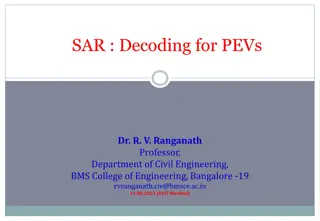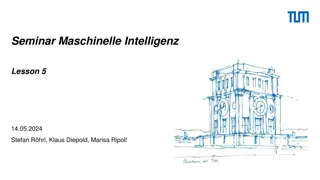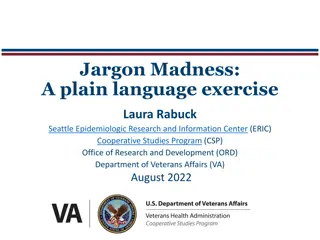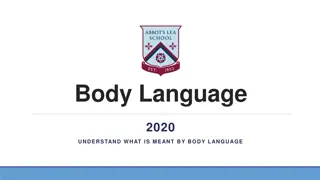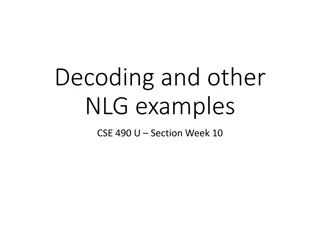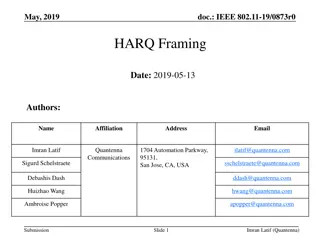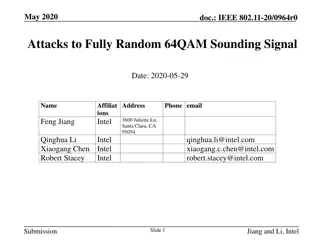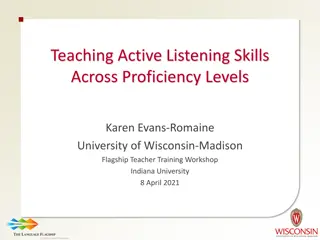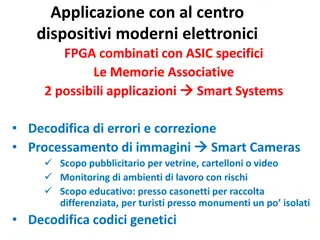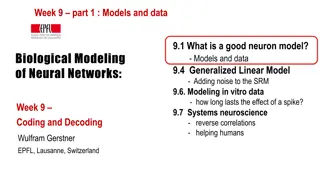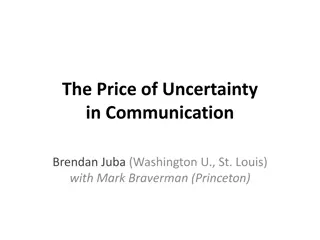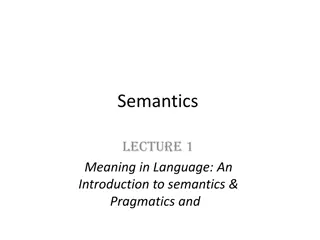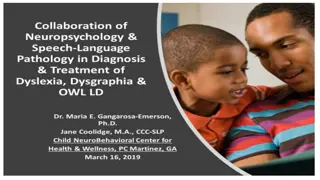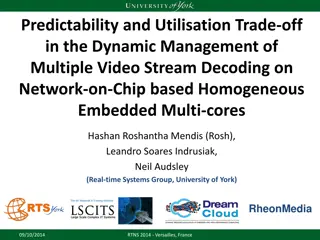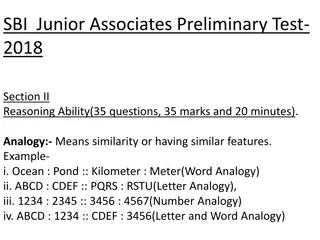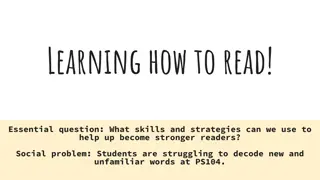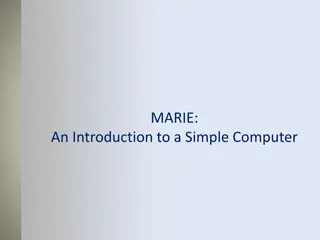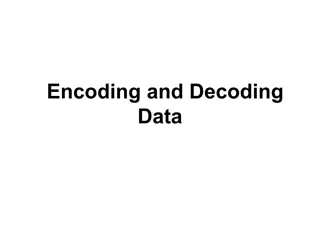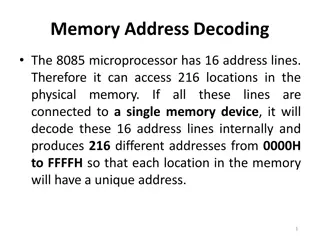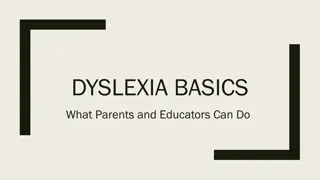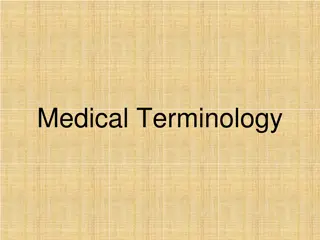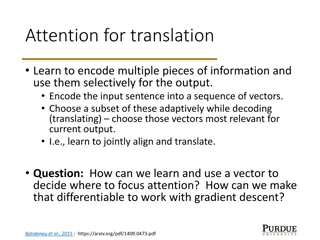SAR : Decoding for PEVs
This document provides detailed information on SAR decoding for Program Educational Videos (PEVs) at BMS College of Engineering in Bangalore. It covers key criteria such as institutional information, program-level details, faculty contributions, student performance, facilities, and continuous improv
0 views • 168 slides
SAR Decoding for PEVs by Dr. R. V. Ranganath at BMS College of Engineering, Bangalore
SAR Decoding for PEVs involves providing preparedness status for the NBA visit, presenting program status to the evaluation team, and documenting evidences to support the program assessment process. The SAR includes institutional and program level criteria, faculty information, facilities, continuou
0 views • 168 slides
Language Study Community – Enhance Your Language Skills
Joining a Language Study Group is a fantastic way to take your language learning to the next level. By leveraging the power of Group Study, you can immerse yourself in the language, enhance your understanding, and build confidence in your speaking abilities. Read full article \/\/explainlearning.com
1 views • 3 slides
Decoding SAR for PEVs by Dr. R. V. Ranganath - BMS College of Engineering
Decoding SAR (Self-Assessment Report) for PEVs (Program Evaluation Visits) provides a comprehensive overview of preparedness status, program criteria evaluation, and institutional information by Dr. R. V. Ranganath, a Professor at BMS College of Engineering in Bangalore. The report covers aspects su
7 views • 166 slides
Academic Language Demands and Supports in Instructional Planning
Academic Language Demands and Supports are crucial in educational settings to ensure comprehension and usage of language by students. This content discusses embedding language demands in lesson plans, providing language supports, and peer review activities to enhance academic language skills. The fo
6 views • 10 slides
The Significance of Media in Language Learning
Media plays a crucial role in language learning by raising awareness of the ideology behind linguistic structures and providing valuable information on society and culture. Linguists are drawn to media language for research purposes and to understand its impact on language use and attitudes. Media s
12 views • 5 slides
Understanding Translation: Key Concepts and Definitions
Translation involves transferring written text from one language to another, while interpreting deals with oral communication. Etymologically, the term "translation" comes from Latin meaning "to carry over." It is a process of replacing an original text with another in a different language. Translat
11 views • 76 slides
Seminar on Machine Intelligence: Brain Decoding and Collaborative Discussions
The seminar on machine intelligence covered topics like brain decoding for visual perception reconstruction and collaborative group discussions. Participants engaged in analyzing research papers, understanding complex concepts, and exploring implications and limitations of the work. Activities inclu
0 views • 4 slides
Decoding Jargon Madness: A Plain Language Exercise
Explore the concept of Jargon Madness, a plain language exercise to tackle complex jargon in professional settings. Discover why addressing jargon is crucial, what jargon entails, and how to host your Jargon Madness event. This engaging approach encourages clear communication, teamwork, and fosters
0 views • 34 slides
Understanding Body Language: A Comprehensive Guide
Body language is a form of nonverbal communication that involves physical behaviors to convey information. This includes facial expressions, body posture, gestures, eye movement, touch, and use of space. Understanding and interpreting body language involves analyzing aspects like eye contact, facial
1 views • 15 slides
Enhancing Language Learning Across the Curriculum in B.Ed. 1st Year Course
Language Across the Curriculum (LAC) emphasizes that language learning should occur across all subjects, not just in language classrooms. It highlights the importance of incorporating language development into every learning activity, fostering multilingualism in schools. Language plays a crucial ro
2 views • 34 slides
Decoding and NLG Examples in CSE 490U Section Week 10
This content delves into the concept of decoding in natural language generation (NLG) using RNN Encoder-Decoder models. It discusses decoding approaches such as greedy decoding, sampling from probability distributions, and beam search in RNNs. It also explores applications of decoding and machine tr
0 views • 28 slides
EEG Conformer: Convolutional Transformer for EEG Decoding and Visualization
This study introduces the EEG Conformer, a Convolutional Transformer model designed for EEG decoding and visualization. The research presents a cutting-edge approach in neural systems and rehabilitation engineering, offering advancements in EEG analysis techniques. By combining convolutional neural
1 views • 6 slides
Enhancing HARQ Framing for IEEE 802.11 Standards
Hybrid-ARQ (HARQ) is a candidate topic for TGbe presentations in IEEE 802.11 standards. Despite previous unsuccessful attempts, there is renewed interest in enabling HARQ through framing support. This document discusses the importance of presenting HARQ framing, outlining the necessary information a
1 views • 7 slides
Attacks on Fully Random 64QAM Sounding Signal in IEEE 802.11-20/0964r0
Presentation by Intel demonstrates vulnerabilities in fully random QPSK and 64QAM sounding signals in IEEE 802.11-20/0964r0. Proposed attack methods, including Viterbi equalizer attacks, and solutions such as Secure LTF mechanism and windowed FFT are discussed to enhance security in ranging. The pre
0 views • 31 slides
Speech and Language Developmental Milestones: A Bilingual/Multilingual Perspective
Speech and language developmental milestones are crucial for children, regardless of their home language. These milestones encompass receptive language, expressive language, pragmatics, and articulation and phonology. Understanding how a child hears and talks from birth to one year is essential, as
1 views • 23 slides
Enhancing Listening Skills in Language Teaching: Strategies and Challenges
Explore the challenges and strategies for improving listening skills across proficiency levels in language teaching. From decoding word borders to applying background knowledge, discover ways to enhance listening comprehension for learners. Gain insights into micro and macro skills that contribute t
1 views • 42 slides
Innovative Applications of Associative Memory in Modern Electronic Devices
Explore the diverse applications of combining FPGA with specific ASICs and associative memories in smart systems, error decoding, image processing, advertising displays, and workplace monitoring. Learn about Content Addressable Memory (CAM) utilization, pattern matching techniques, and real-life exa
0 views • 18 slides
Decoding English Words: From Syllables to Morphemes
Explore the evolution of English language complexity due to historical invasions, the impact on orthography, and the significance of morphophonemic patterns in decoding, spelling, and understanding English words using Latin and Greek morphemes.
1 views • 22 slides
Biological Modeling of Neuronal Networks: Insights from Neural Dynamics
Exploring neuron models, generalized linear models, and decoding processes in neural networks through intracellular and extracellular recordings, with a focus on processing models, encoding, and decoding of spike trains. The Spike Response Model and likelihood of spike trains are discussed, providin
0 views • 32 slides
Decoding Uncertainty in Communication: Exploring Prior Distributions and Coding Schemes
Delve into the intricate world of communication under uncertainty, where decoding messages accurately is paramount. Discover how prior distributions, encoding schemes, and closeness metrics influence the efficiency and effectiveness of communication between parties sharing different priors.
0 views • 22 slides
Introduction to Meaning in Language: Semantics & Pragmatics
Meaning in language is explored in this introductory lecture, covering aspects such as communication, semiotics, linguistic channels, and approaches to studying meaning. The process of encoding messages, signal transmission, noise interference, and decoding are discussed within the context of commun
0 views • 19 slides
Introduction to Language Technologies at Jožef Stefan International Postgraduate School
This module on Knowledge Technologies at Jožef Stefan International Postgraduate School explores various aspects of Language Technologies, including Computational Linguistics, Natural Language Processing, and Human Language Technologies. The course covers computer processing of natural language, ap
0 views • 27 slides
Decoding Japanese Language Patterns Through Linguistic Analysis
Explore the intricacies of the Japanese language script, including Kanji, Katakana, and Hiragana characters. Delve into a puzzling journey of deciphering meanings, characters, and syllables, drawing comparisons between word lengths and exploring linguistic systems. Join the quest to unravel the chal
0 views • 30 slides
Understanding Dysgraphia, Dyslexia, and OWLLD
Dysgraphia, dyslexia, and oral and written language learning disability (OWLLD) are distinct learning challenges affecting different areas of language processing. Dysgraphia primarily impacts spelling and handwriting due to motor memory and visual spelling issues. Dyslexia involves difficulties in p
0 views • 8 slides
Exploring Sociolinguistics: Language Variation and Social Factors
Sociolinguistics delves into the study of language variation influenced by social factors, examining the relationship between language and its social context. It explores various aspects like standard pronunciation, language choice, speech acts, language components, language variety, and factors suc
0 views • 73 slides
Predictability and Utilisation Trade-off in Video Stream Decoding Management
This study explores the trade-off between predictability and utilisation in managing multiple video stream decoding tasks on Network-on-Chip based embedded multi-cores. The objective is to make predictable admission control decisions while maintaining high system utilisation. Metrics include minimiz
0 views • 29 slides
Reasoning Ability Test - Analogy, Classification, Coding-Decoding Examples
Explore analogy, classification, and coding-decoding examples from the SBI Junior Associates Preliminary Test 2018 section on Reasoning Ability. Test your logical thinking skills with questions and answers related to similarities, grouping objects, and secret message patterns.
0 views • 10 slides
Understanding Assembly Language Programming for Computing Layers
Assembly language is a low-level programming language that enables direct interaction with a computer's hardware components. This content explores the fundamentals of assembly language, the relationship between human-readable machine language and binary code, an assembly language program for multipl
0 views • 31 slides
Strategies to Improve Word Decoding Skills in Struggling Readers at PS104
Students at PS104 are facing challenges in decoding new words, impacting their reading abilities. Common mistakes include guessing words, relying solely on pictures, and forgetting to track under each word. Strategies such as phonics programs and cueing systems are being explored to enhance reading
0 views • 15 slides
Supporting Children's Comprehension Skills in Year 6 Reading
Studies show that 1 in 10 children with adequate decoding skills struggle with comprehension, impacting motivation and academic performance. Parents can help by engaging in daily reading activities, visiting libraries, and asking questions. Year 6 assessments focus on decoding, understanding, infere
0 views • 17 slides
Understanding Language Anxiety in Foreign Language Learning and Teaching
Explore the impact of language anxiety on students and teachers in foreign language learning and teaching contexts through insights from Dr. Christina Gkonou's research. Delve into the theoretical background, implications for language education, and real-life experiences shared at the Essex Language
0 views • 25 slides
Understanding MARIE: Introduction to Simple Computer System
An introduction to MARIE, a simple computer system, explaining a program written in assembly language that adds two numbers and stores the result in memory. The process involves fetching, decoding, and executing instructions. The importance of assemblers in translating assembly language to machine c
0 views • 14 slides
Understanding Encoding and Decoding Data Principles
Data encoding involves converting information into a different form using specific rules, which is then decoded back to its original state. This process is crucial for secure communication, as seen in examples like Morse Code. Through encoding, messages can be kept confidential and accessed only by
0 views • 7 slides
Memory Address Decoding in 8085 Microprocessor
The 8085 microprocessor with 16 address lines can access 216 locations in physical memory. Utilizing a 74LS138 address decoder, chip select signals are generated for memory block selection. The interfacing involves decoding address lines to enable memory access, with distinctions between RAM and ROM
0 views • 18 slides
Combined Classification and Channel Basis Selection with L1-L2 Regularization for P300 Speller System
This study presents a method that combines classification and channel basis selection using L1-L2 regularization for the P300 Speller System. The approach involves EEG signal processing, feature extraction, P300 detection, and character decoding. The proposed method aims to improve decoding accuracy
0 views • 17 slides
Understanding Dyslexia: What Parents and Educators Can Do
Dyslexia is a specific learning disability of neurobiological origin, characterized by difficulties in word recognition, spelling, and decoding. It stems from a deficit in the phonological component of language, impacting reading comprehension and vocabulary growth. Proper support and effective clas
0 views • 21 slides
Understanding Medical Terminology: Word Parts and Decoding
Essential knowledge of medical terminology involves understanding prefixes, suffixes, and root words. By dissecting word parts, health professionals can decipher complex terms and accurately interpret medical language. This guide highlights the role of root words, prefixes, suffixes, combining vowel
1 views • 24 slides
Insights into the Rowhammering.BIKE Cryptosystem and Decoding Strategies
Explore the Rowhammering.BIKE cryptosystem, its parameters, and the black-grey flip decoder. Learn about the bitflipping algorithm, prior analysis of DFR in QC-MDPC decoders, and strategies for key recovery and decoding in this innovative system. Discover how understanding the error patterns related
0 views • 7 slides
Understanding Attention Mechanism in Neural Machine Translation
In neural machine translation, attention mechanisms allow selective encoding of information and adaptive decoding for accurate output generation. By learning to align and translate, attention models encode input sequences into vectors, focusing on relevant parts during decoding. Utilizing soft atten
0 views • 17 slides



